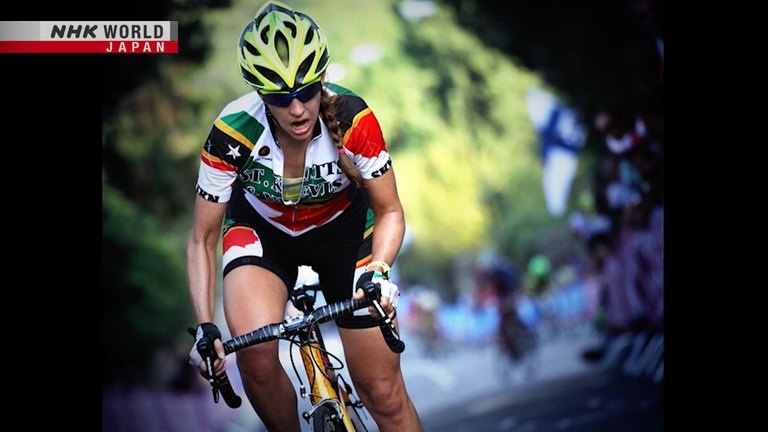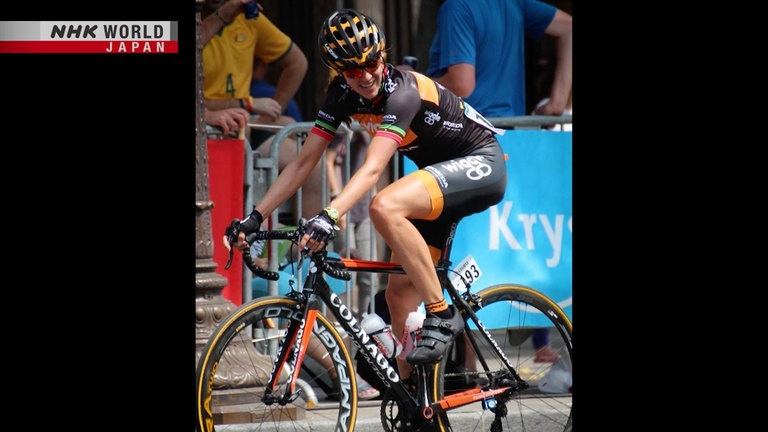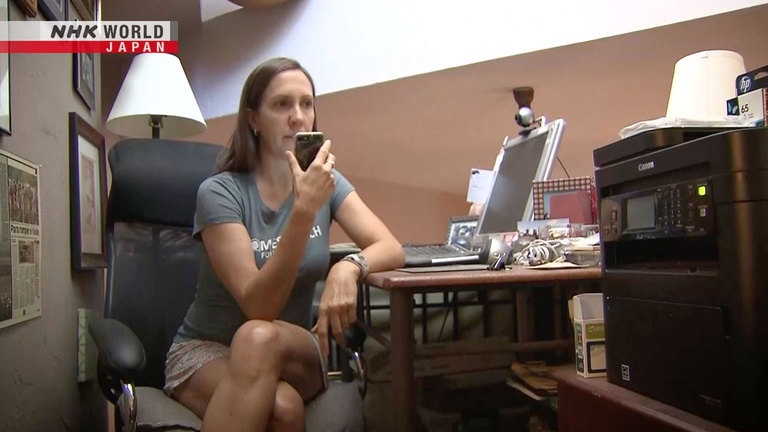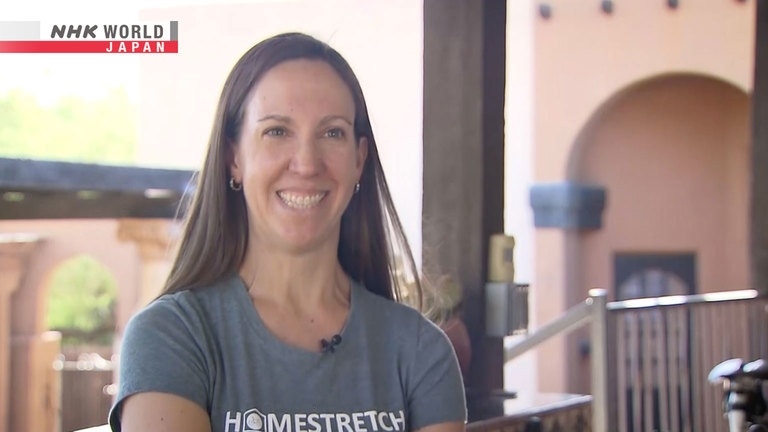Sportswomen Shining With Equality: Kathryn Bertine / Former Pro Cyclist & Activist
Besides helping to revive the Tour de France Femmes for the first time in 13 years, Kathryn Bertine, former pro cyclist and CEO of an NPO, strives to eliminate gender disparities in the cycling world.




Transcript
Direct Talk
In recent years, the gender gap in sports
has become a frequent
and controversial issue.
Kathryn Bertine has been working
to eliminate the gen-der pay gap
in professional sports in the United States.
Kathryn Bertine
Former Pro Cyclist & Activist
As a pro cyclist until 2017,
she personally experienced
significant gender disparities
in prize money, wages,
and racing opportunities.
So when I started looking around at this,
I said,
"This doesn't make any sense!"
"Why is it like this?"
And there were
no good answers to that question,
so that's when I started.
Bertine now organizes
a non-profit organization
that provides support to
female professional athletes
who have suffered from treatment issues.
She was also instrumental in the revival
of the "Tour de France Femmes,"
the women's version of the Tour de France.
It was held for the first time in 13 years.
Sportswomen Shining With Equality
Bertine works for better treatment
for female athletes
and chances for them to play active roles.
Let's hear what she has to say.
Sportswomen Shining With Equality
Oh, I absolutely believe that
gender equality in sport is possible,
otherwise I wouldn't be here fighting for it.
So I fully believe that
we can tackle these issues.
And, honestly, sometimes it can be
as easy as bringing that knowledge
to the powers that be to
make that change happen.
Sometimes it's not so easy
because the powers that be
don't want that responsibility.
But that's where as an activist,
an advocate for what we believe in,
we truly can make change happen
if we band together as a team,
which I learned,
which I learned the hard way.
And magic is gonna happen
when you surround yourself with
the same, like-minded people
who are willing to work and fight for
this change to occur.
Bertine is currently the CEO
of the Homestretch Foundation,
a non-profit organization that
supports female professional athletes.
I'm going to show you
some of the Homestretch House.
Here we go...
This is the dining room/office area...
Here is the living room
and the stretching room.
The Homestretch Foundation
offers housing, food,
and a training environment
for athletes who are professionals
but lack a base salary,
prize money, or sponsor support,
and whose income is
below the poverty line.
Even today, many female athletes face
a glass ceiling and a huge wage gap
that prevent them from devoting
themselves solely to competition.
Yeah, it's so nice being here
and Kathryn putting me up and
providing her house to all these athletes
and being able to train and
not really think about anything else
and just having that dedicated time.
Because I had just
such a stressful school semester.
I had been working full-time
and then I had been in school full-time
and training full-time,
and so for me to come here and
just be able to train and focus on myself
has been so helpful.
Back in 2015 and 2016, by the time
I got into the World Tour level,
I almost had to quit the sport
because I couldn't afford to just be
a professional cyclist at the highest level.
I also had to carry 1-2 part-time jobs
just to support myself
while training and racing.
Yet, had I been a man
at the World Tour level,
that wouldn't have been the case.
I thought, "Wouldn't it be amazing
if we could help the female pro cyclists
who need a place to live and train for free,
without paying rent,
without paying utilities."
So that was where the idea came from.
As they say,
necessity is the mother of invention,
and for me, I needed those things
and they weren't available,
so I thought maybe we could
make that happen for the next generation.
Bertine was a figure skater
until the age of 23,
and eventually she started cycling.
Until 2017, she was a professional cyclist.
The titles she won
included Caribbean Champion,
and at one point she was even
aiming to compete in the Olympics.
Bertine actively challenged herself
in various competitions and activities.
The force behind her positivity
was her father.
I could see from the picture
when he was trying to hold you.
That's one of my favorite pictures!
That was my dad.
I was jumping off a stool as a 4-year-old.
I was lucky to grow up with the kind of
parents who were just supportive,
specifically my dad.
He was a big motivator for me,
just because he was positive
and he believed in me.
And even in those skating competitions,
if I had one of those days
where I just fell down all the time,
he'd be the first one to say,
"You can do it!"
"I thought you won."
"You look great!"
So it might be genetic
that I have this gene in me about positivity!
But when I think about
my biggest supporter being my dad,
and he's no longer with us,
but he lives on in spirit,
and I take a lot of that energy
and I think like, "Alright, dad
how do you feel about this?"
And it helps, it helps a lot.
During the six years since
the Homestretch Foundation was established,
it's been used by 75 athletes
from 17 countries.
Bertine carries out
negotiation with the teams
with whom the athletes have made a contract
in order to ensure that
they get paid their "base salary"
as required by the
UCI, International Cycling Union.
She has also continued to appeal to the UCI
for gender equality in terms of
a minimum wage and race content.
During the last ten years
in which Bertine has
dedicated herself to these issues,
the cycling world has seen
incremental improvements.
UCI, the International Cycling Union,
has pledged to raise the
minimum base salary for women
to the same amount as for men by 2023.
Equal pay!
Today, in the world of sports,
female athletes are increasingly
raising their voices for their own rights.
The players who led the U.S. women's
soccer team to the World Cup championship
complained about the inequality of
prize money between men and women.
We need to come together as a country
and try to figure out ways to
make this place better for everyone
and I don't think any of
his policies really have in mind
of trying to make it better for everyone.
At the 2022 Beijing winter Olympics,
the lack of a women's quota
in the ski jumping large hill competition
was called into question.
Why am I not there?
Why don't I have medal chances, too?
Why don't I have this experience as well?
Providing equal competition opportunities
is also a major challenge.
Over the past few years,
Bertine has been focusing on reviving the
women's version of the Tour de France.
The "Tour de France Femmes"
was held from 1984 to 2009.
However, due to problems with
its revenue and administration,
it ceased to exist.
For Bertine, who was
a pro cyclist at the time,
participating in the Tour de France
was something to aspire to.
In 2013, in order to seek revival of the
"Tour de France Femmes,"
she co-founded a campaigning organization
called "Le Tour Entier,"
which appealed to ASO,
the Tour de France organizer,
for its return by collecting
signatures and other means.
The petition for "Le Tour Entier"
on Change.org
garnered over 98,000 signatures,
and we were still going strong,
even after it was declared a victory.
And then the media got involved
and kept asking ASO,
"What are you going to do?
What are you going to say?"
And ASO didn't like us at all!
They felt that we were being
quite annoying to them,
which is a good sign of victory!
ASO was very nervous.
They said,
"We just want to do a one-day race.
We don't know if this whole
equality thing is going to work."
And we said,
"It's OK to do one race the first year,
but the agreement was
they would grow the Tour de France
incrementally 3-5 days each year
until it would be full equity
with the men's race."
In 2014,
thanks to the appeal,
a one-day race, "La Cruz,"
was held during the
period of the Tour de France.
The 2014 race was a huge success
in terms of sponsors, visibility,
viewing, it was incredible.
And ASO said,
"OK, we will do this again in 2015."
And they kept the one-day format,
and then they started shifting the race
from this location to this location,
but they didn't stick true to their promise
of growing la Cruz to the Tour de France.
Bertine and her team had been calling for
the return of a multi-day "stage race,"
so they were not satisfied with
a one-day only event.
In the eight years
that have passed since then,
their efforts have borne fruit,
and the "Tour de France Femmes"
was finally revived in 2022.
We've always wondered
why we couldn't have a week-long stage race.
But this year our ream finally came true!
The men's race lasts 21 days,
whereas the women's race,
with only eight stages, lasts eight days.
24 teams of female athletes competed in 2022.
The race was televised throughout Europe,
with the audience share
peaking at 45.6% in France,
and an average audience share
of 45% in the Netherlands.
So for us to now have "Tour de France"
be part of the name of this race
is a huge victory.
We are back. That's a good sign,
and we are very much applauding
that this race is happening.
However,
Tour de France Femmes is 8 days,
and the men race 21 days.
So there is still that discrepancy of
"Oh, well, the women possibly
couldn't do 21 days!"
And we're still changing the system,
because that's not OK,
it's not OK that the women only get
a fraction of what the men get,
based on the idea that they can only do that.
We can do much more than that!
Bertine says there is one more important
factor in redressing the gender gap.
The most important part
in fighting for equity is to have
equal visibility,
equal broadcasting,
and that, too, is something that can,
and should be, mandated at the highest level.
And right now in women's pro cycling,
they will broadcast 3-6 hours of a men's race,
and women are usually lucky
if they get half the broadcast time,
sometimes not even at all.
And that is what has to change
and be a mandate at the World Tour level,
because otherwise it's a
chicken-and-egg cycle of saying,
"Oh, well, how can we support
women's cycling if we don't see it?"
"How can we see it if it's not supported?"
So the only way to end that is
for the Federation to actually say,
"No, it has to be mandatory
equal media coverage
for the men's and the women's races."
We asked Bertine to share her motto.
I'm not an artist!
So we picked this phrase
"Together we all move forward!"
because that really is the truth of
how we get anything good done in life:
to band together,
to not do everything individually,
but just do it with others in mind,
and with a team around you.
So, "Together we all move forward!"
has been the creed at Homestretch Foundation
since its inception.
It's how we get stuff done,
and things that are meaningful in this world.
There is a lot of times people will ask,
"Oh, do you want to franchise Homestretch?
Shouldn't we have many more of these?"
And the answer is,
"No. What we would love
is to shut Homestretch down
because everybody's being paid equally
and we're no longer necessary!"
And wouldn't it be great to see
Homestretch transform into something
that could help the lower athletes
get to the next level
rather than have to fight for salary,
but to be the medium that has a pipeline
from grass roots
to World Tour;
where can we fall on that spectrum to
help the next athletes that are in need?
That to me would be really great,
so I would love to see
Homestretch transform in the future.
But do we want a franchise
for women's unequal pay?
Absolutely not!
Together we all move forward!